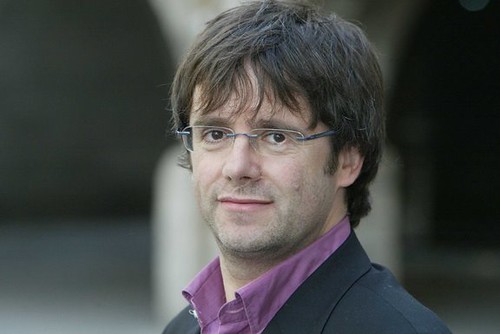Fugitive Catalan leader holds key to Spanish electoral impasse
Former Catalan regional government head Carles Puigdemont, who lives in self-imposed exile in Belgium since leading a failed push to split Catalonia from Spain in 2017, unexpectedly finds himself a potential kingmaker after no bloc on the left or right won enough seats to form a majority. One path out of the labyrinth would be for Socialist Prime Minister Pedro Sanchez to secure a vote in favour, or at least an abstention, of his forming a government from Puigdemont's Junts party in exchange for further concessions on independence.

A Catalan independence leader on the run from Spanish justice could hold the key to unlocking a political impasse after Sunday's election ended in a hung parliament. Former Catalan regional government head Carles Puigdemont, who lives in self-imposed exile in Belgium since leading a failed push to split Catalonia from Spain in 2017, unexpectedly finds himself a potential kingmaker after no bloc on the left or right won enough seats to form a majority.
One path out of the labyrinth would be for Socialist Prime Minister Pedro Sanchez to secure a vote in favour, or at least an abstention, of his forming a government from Puigdemont's Junts party in exchange for further concessions on independence. The centre-right People's Party (PP) and the far-right Vox won the most seats in parliament with a combined 169 - short of the 176 seats needed for a majority and confounding poll predictions.
The ruling Socialists (PSOE) and far-left Sumar won 153 but have more possibilities for negotiating support from small Basque and Catalan separatist parties, as they did following 2019's election. Sanchez could win over left-wing separatist party Esquerra Republicana de Catalunya (ERC), as he did to form a minority government in 2020. But he will likely also need the backing of the more hardline Junts, which has not supported Sanchez in the past four years.
Centre-right Junts has not conveyed a clear position but has vowed to adopt a more confrontational approach than ERC. Its Secretary General Jordi Turull said on Monday he would use the "window of opportunity" created by the election impasse to achieve Catalan independence.
"The state knows that if it wants to negotiate with us, there are two issues that are fundamental and generate consensus in Catalonia which are an amnesty and self-determination," he said in an interview with local radio station RAC 1. Turull was among the nine Catalan jailed separatist leaders pardoned by Sanchez in 2021. However, many more are still facing trial over their role, chief amongst them Puidgemont.
Puigdemont, who still wields considerable influence within Junts, said in mid-July that Junts would not support Sanchez because he was unreliable. Early on Monday he tweeted that Junts is a party that keeps its word. "We have to continue defending Catalonia against those who want to liquidate our language, culture and nation," he said, without elaborating.
"The PSOE is at the mercy of Puigdemont," said Ignacio Torreblanca, head of the Madrid office at the European Council on Foreign Relations. After winning the most seats, the PP will be given the first stab at trying to cobble together enough votes in parliament to win a prime-ministerial investiture vote.
But its alliance with the far-right Vox and tough stance on separatism will make it difficult to gain support from any other faction. "It is a very difficult situation to resolve," a Vox official told Reuters.
If neither bloc is able to garner enough parliamentary support to form a government, a second election is a possible outcome. Spanish stocks fell and government bond prices dipped in early trading amid the prospect of a protracted deadlock.
The results showed the deep divisions in Spanish society. Sanchez called the elections in a gamble after his Socialist Party took a drubbing in local elections in May. His political opponents highlighted his reliance on the regional separatist parties, saying this threatened the nation itself.
The PP however, had looked set to need a alliance with Vox to govern, an outcome that would have brought hardline nationalists into government for the first time since the end of the Franco dictatorship and Spain's return to democracy in the 1970s. As it happened, the Socialists performed better than polls had predicted, helped by a last-minute gaffes by PP leader Alberto Nunez Feijoo.
Feijoo nonetheless claimed victory and urged other parties not to block his bid to form a government for the sake of stability in Spain. SEPARATIST DEMANDS
The seats of Basque parties are also likely to come into play. "After the election, we have a very, very difficult parliamentary arithmetic, but it seems our votes will be once again decisive," Anionic Ortuzar, leader of moderate nationalist Basque party PNV, said on Sunday night. PNV secured five seats in the lower house.
Arnaldo Otegi, the head of Basque separatist EH Bildu party, said he would definitely not support the PP and Vox to form a government. "If it depends on us, 'no pasaran'," he said, using a civil war-era Republican slogan, meaning "they shall not pass", in reference to PP and Vox. His party got 6 seats. Otegi did not mention the likelihood of supporting a leftist coalition.
The likely slim margin of an investiture vote means even the single seat obtained by other regionalist groups - from Canary Islands, northwestern Galicia and northeastern Navarra - could turn decisive. The law does not set a deadline for the process but if no candidate secures a majority within two months of the first vote on the prime minister, new elections must be held.
(This story has not been edited by Devdiscourse staff and is auto-generated from a syndicated feed.)










